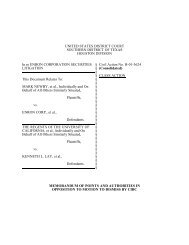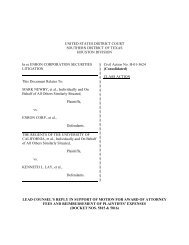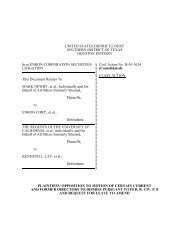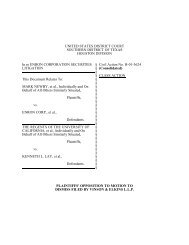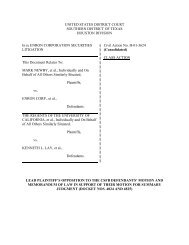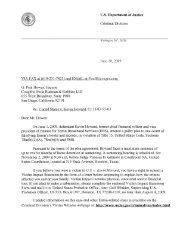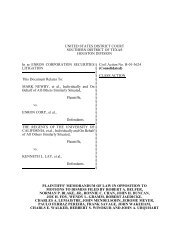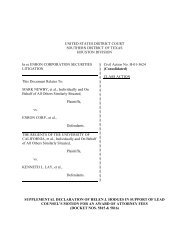Declaration Of Helen J. Hodges In Support Of Lead Counsel's ...
Declaration Of Helen J. Hodges In Support Of Lead Counsel's ...
Declaration Of Helen J. Hodges In Support Of Lead Counsel's ...
Create successful ePaper yourself
Turn your PDF publications into a flip-book with our unique Google optimized e-Paper software.
the Pleadings (Docket No. 5019). On November 17, 2005, <strong>Lead</strong> Counsel filed <strong>Lead</strong> Plaintiff’s<br />
Supplemental Memorandum in <strong>Support</strong> of Its Motion for Reconsideration, or in the Alternative,<br />
Clarification of Order Granting Barclays Plc’s Motion for Summary Judgment (Docket No. 5203) on<br />
the pleadings, which argued that Barclays was an integral part of the scheme to defraud investors;<br />
and Barclays and the transactions it did with Enron were part of the scheme to defraud investors.<br />
The Court agreed with <strong>Lead</strong> Plaintiff’s argument regarding the procedural impropriety of granting<br />
the motion, and thus vacated the dismissal of Barclays, allowing for repleading. See 12/5/06<br />
Opinion and Order re Barclays Motion for Reconsideration (Docket No. 5242) at 11-12.<br />
273. On November 1, 2006, the Fifth Circuit Court of Appeals granted the defendants’<br />
petitions for appeal seeking interlocutory review under Rule 23(f) of the Court’s order granting class<br />
certification. On December 4, 2006, Credit Suisse filed its 60-page Brief of Appellants Credit Suisse<br />
First Boston (USA), <strong>In</strong>c., Credit Suisse First Boston LLC and Pershing LLC, which argued for<br />
reversal of the class certification order because the Court’s class certification decision relied on an<br />
erroneous primary violator test; the liability theory adopted by the Court in order to certify the Class<br />
was contrary to the law and eliminated loss causation; and the Court erred in ruling that the Class<br />
may proceed under both an Affiliated Ute and a fraud-on-the-market presumption of reliance. On<br />
December 4, 2006, V&E filed its 37-page Brief of Appellant Vinson & Elkins LLP, which argued<br />
for reversal of the class certification order because the Court’s application of the fraud-on-the-market<br />
presumption relied on a flawed interpretation of liability; and plaintiffs lacked standing to sue<br />
defendant for statements made by Enron. On December 4, 2006, Merrill Lynch filed its 60-page<br />
Brief of Merrill Lynch Appellants, which argued for reversal of the class certification order because<br />
by it, the Court violated the prohibition against aiding and abetting liability; there was no distinction<br />
between the plaintiff’s scheme theory and conspiracy liability; there was a failure of proof of<br />
reliance under Central Bank, Greenberg, and Affiliated Ute; there was noncompliance with the<br />
- 151 -



